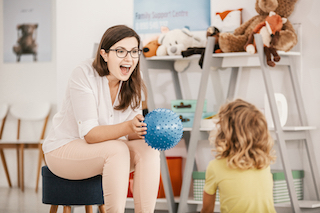 According to the Centers for Disease Control and Prevention, the prevalence of Autism Spectrum Disorder (ASD) in children is 1 in 59 and boys are four times more likely to be diagnosed with autism than girls. Research has shown that early intervention can help improve communication skills and the most well known autism therapy is Applied Behavior Analysis (ABA). A new study looked at a type of ABA which is showing great promise in helping children with autism.
According to the Centers for Disease Control and Prevention, the prevalence of Autism Spectrum Disorder (ASD) in children is 1 in 59 and boys are four times more likely to be diagnosed with autism than girls. Research has shown that early intervention can help improve communication skills and the most well known autism therapy is Applied Behavior Analysis (ABA). A new study looked at a type of ABA which is showing great promise in helping children with autism.
The study, published in the Journal of Pediatrics, compared the effects of combining parent-delivered and therapist-delivered Pivotal Response Treatment over six months on the social communication skills in children with autism compared with a community treatment control group.
Pivotal Response Treatment (PRT) is a type of ABA used in the treatment of children with autism. The goal of PRT is to teach during natural play routines and thereby motivate the child to engage in meaningful interactions.
“We expected that parents would be able to learn PRT during the study and that the children in the PRT group would show greater improvement in communication skills compared to children in the control group who were receiving stable community-based interventions,” study author Grace Gengoux told us. “Even though PRT is considered an established treatment for autism, there have been relatively few studies using a randomized controlled trial design and not very much is known about the effects of combining parent-delivered and clinician-delivered treatment sessions."
Genoux says comparing groups of children who have similar characteristics and who receive different interventions in a controlled trial is necessary to better understand the kinds of outcomes that can be expected from PRT.
Researchers recruited a group of children between the ages of two and five who had both ASD and significant language delay and randomly assigned them to either the PRT group or a control group. Of the 43 families who completed the trial, 23 received both PRT parent training and clinician-delivered PRT at home and the other 20 families were assigned to the control group and continued to receive stable community treatments.
After six months, researchers compared the amount of change in the child’s communication and social behaviors during parent-child interaction videos, standardized assessments and parent-questionnaires.
“Our study showed that children who received the PRT improved their communication skills more than children receiving stable community treatments,” Gengoux told us. “They talked more frequently during video-recorded interactions with their parents in the clinic and parents also reported that the children were using a bigger vocabulary of words at home. The children in PRT also showed more improvement in social skills when playing with their parents and they were rated as more improved by an expert clinician who did not know which group (PRT vs control) the child had been in.”
Researchers were extremely pleased with what they found.
“We expected that PRT would help children improve their communication skills,” Grace Gengoux told us. “We were excited to see how much PRT also improved their social functioning during interactions with their parents. We were surprised to find that the children who started our study with lower nonverbal abilities were the ones who benefited most in their social communication skill development. However, this new finding will need to be replicated in a larger trial before we will have confidence that it is a consistent effect.”
Genoux believes this study adds to the growing body of evidence in support of Naturalistic Developmental Behavioral Interventions (NDBI) which combine principles of ABA and developmental theory to treat ASD symptoms.
“The study’s results provide confirmation of the strong effects of PRT on communication skills of children with ASD, as well as new evidence that PRT improves core social deficits,” Genoux told us. “Parents seeking treatment for a child with ASD can now have even more confidence that treatments based on PRT can help improve child communication and social skills.”
Patricia Tomasi is a mom, maternal mental health advocate, journalist, and speaker. She writes regularly for the Huffington Post Canada, focusing primarily on maternal mental health after suffering from severe postpartum anxiety twice. You can find her Huffington Post biography here. Patricia is also a Patient Expert Advisor for the North American-based, Maternal Mental Health Research Collective and is the founder of the online peer support group - Facebook Postpartum Depression & Anxiety Support Group - with over 1500 members worldwide. Blog: www.patriciatomasiblog.wordpress.com
Email: tomasi.patricia@gmail.com